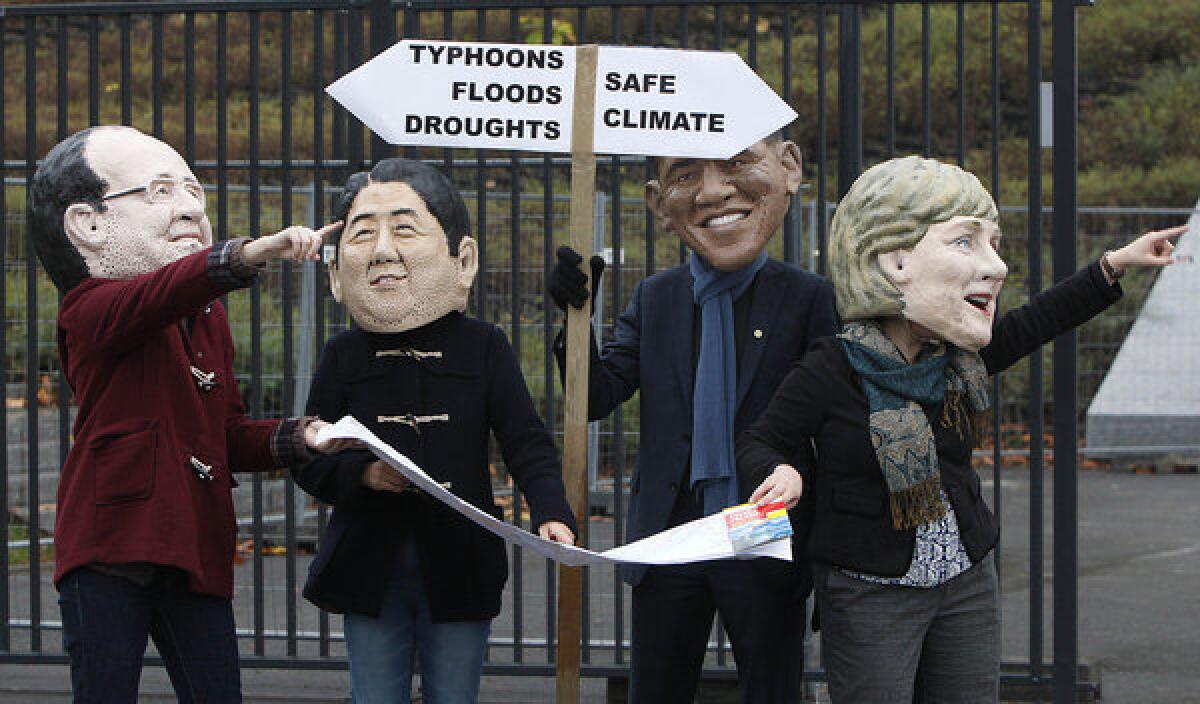Rich-vs.-poor nations’ clash stalls work toward 2015 climate pact

The issue that has prevented a major advance in the battle against global warming for two decades has scuttled progress at the latest U.N. gathering aimed at forging a climate pact by 2015: how much rich nations should pay to help developing countries build their economies with clean-energy sources.
The United States and the European Union wanted a firm deadline set at the conference in Warsaw for each of the 195 countries party to the talks to make commitments on emissions reductions that will be enshrined in a new global climate pact at a meeting in Paris in December 2015.
But China, India and a self-proclaimed group of “like-minded” countries resisted setting a deadline for specific commitments at the Warsaw conference, arguing that they shouldn’t be required to make the same investments to reduce carbon output as rich nations that created the problem of greenhouse gases by burning fossil fuels during their largely unregulated industrialization in past centuries.
With China now emitting more carbon than any other country and its economy poised to overtake that of the United States in just a few years, the Western countries have balked at committing to what they see as an increasingly outdated financing model.
After a 30-hour marathon of closed-door negotiations that concluded Saturday, the two-week Warsaw conference fizzled to an inconclusive end, with drafters of the final document substituting the word “contributions” in the place of “commitments,” according to news agency reports. That allowed both sides to claim victory, with the U.S. and Europe having secured their “deadlines” and the developing nations bloc able to define for themselves what “contribution” each is prepared to make to reduce emissions.
A rich-versus-poor nations dispute also hampered progress on a proposed “loss and damage mechanism” to provide aid to countries hit by major disasters thought to be related to climate change, such as the typhoon in the Philippines this month that has left more than 5,000 dead. The United States and the European Union, although willing to help poorer countries fight the effects of climate change, objected to taking on legal obligations for severe-weather events.
The Warsaw gathering did make notable progress in pledging greater protection of the forests in developing nations. Trees mitigate harmful emissions by absorbing carbon dioxide, and deforestation is said to account for 20% of the greenhouse gas accumulation.
“The ministers have been working for almost 10 years to finalize the rules which will allow donors to invest in forest management practices in the developing world and get a way to verify the emissions reductions,” Paul Bledsoe, an energy research fellow at the German Marshall Fund, told the BBC.
A revised strategy by Japan for fighting global warming also drew some praise from environmental advocates.
“Japan’s decision to give up on the approach to climate policy that has failed for the past 20 years could be a breakthrough for smarter climate policies. With its promise to spend $110 billion over five years for innovation in environmental and energy technologies, the Japanese government is right on track,” said Bjorn Lomborg, director of the Copenhagen Consensus Center, a think tank dedicated to making better use of government and philanthropic grant money.
But the delegates’ failure to secure agreement on emissions reduction commitments in time to prepare a new treaty for the Paris meeting in two years has created doubts that the 21-year-old forum will be able to take the global warming fight forward after 2020. That is the date by which the developed-country signatories to the 1997 Kyoto Protocol are supposed to have reduced their carbon output to 20% below their 1990 levels and a new plan forward should go into force -- the Paris treaty.
ALSO:
Poll: Toronto mayor’s popularity unscathed by scandals, lost clout
British seek answers in case of 3 women bound by ‘invisible handcuffs’
Pakistan doctor who helped CIA find Bin Laden is charged with murder
Twitter: @cjwilliamslat
More to Read
Sign up for Essential California
The most important California stories and recommendations in your inbox every morning.
You may occasionally receive promotional content from the Los Angeles Times.











